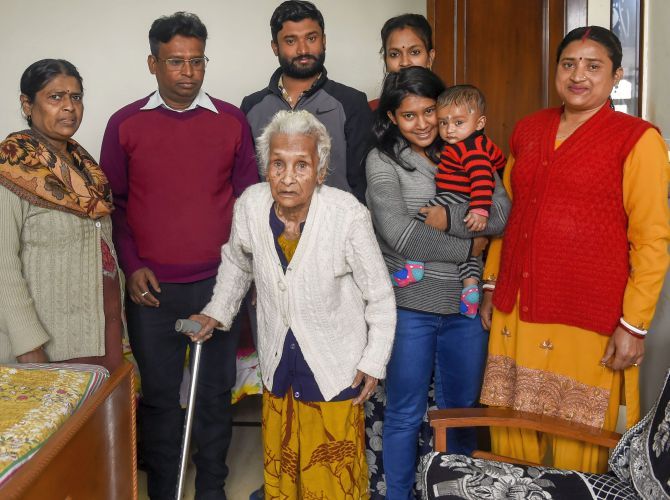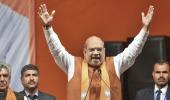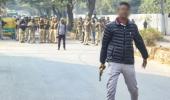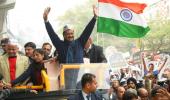The ruling AAP is going into the Delhi election with the hope to repeat its stellar performance of the last assembly polls, while the BJP, which bagged all seven seats here in the Lok Sabha election, will be aiming at expanding its vote share in the national capital.

The national capital votes Saturday to elect a new government, after a campaign in which the Bharatiya Janata Party pulled no punches against the Aam Aadmi Party which is eyeing another term in office.
The Congress is the third main force in the contest in which 672 candidates are in the fray for 70 assembly seats.
Over 1.47 crore voters are eligible to exercise their franchise.
Polling will begin at 8 am and will end at 6 pm.
The ruling Aam Aadmi Party is going into the Delhi election with the hope to repeat its stellar performance of the last assembly polls, while the Bharatiya Janata Party, which bagged all seven seats here in the Lok Sabha election in May 2019, will be aiming at expanding its vote share in the national capital.
The Congress is seeking to better its performance than last time when it did not bag any seat in the assembly polls but improved its vote share in 2019 polls.

The AAP had got 54.3 per cent votes in the 2015 assembly polls, while the BJP secured 32 per cent and the Congress bagged just 9.6 per cent of the total votes polled.
The BJP mounted its one of the most aggressive campaigns in the Delhi assembly polls so far, with Union home minister Amit Shah leading the saffron charge fuelled by its planks of Hindutva and nationalism and its strident opposition to anti-Citizenship Amendment Act protest in Shaheen Bagh.
On the other hand, the AAP tried to hard sell its development agenda, while the Congress sought to showcase its achievements during its 15-year rule under Sheila Dikshit from 1998 to 2013.
Riding on tech-savvy elements like QR codes and mobile apps, poll authorities have geared up for the polls, making tight security arrangements across the national capital and keeping an extra vigil in Shaheen Bagh and other sensitive polling areas.
In view of the ongoing anti-CAA protests in Shaheen Bagh, the Delhi CEO Office has put all five polling stations in the area under the "critical" category, and confidence-building measures are continuously being undertaken to reassure voters, officials said.
Shaheen Bagh falls in the Okhla assembly constituency.

The area has become the epicentre of protests against the Citizenship Amendment Act in the national capital and the agitation has been thrust by political parties into a poll issue.
The police have deployed around 40,000 security personnel, 19,000 home guards and 190 companies of Central Armed Police Forces to ensure smooth conduct of the polls.
Delhi Chief Electoral Officer Ranbir Singh said 1,47,86,382 people are eligible to vote in the Delhi polls, and 2,32,815 are in the age group of 18-19.
Voters in various categories include males (81,05,236), females (66,80,277), service voters (11,608), third gender voters (869), and senior citizens (aged 80 and above) voters (2,04,830), officials said.
On Friday, chief minister Arvind Kejriwal and BJP's Delhi unit chief Manoj Tiwari paid obeisance at famous temples in the national capital.

Kejriwal, the national convener of the Aam Aadmi Party, along with his wife Sunita offered prayers at the famous Hanuman Temple at Connaught Place.
"Sought blessings of Hanuman ji at famous Hanuman temple at CP. Bhagwan ji said-'You are doing good work. Continue serving people like this. Leave the outcome to me, all will be fine," Kejriwal said in a tweet in Hindi.
Tiwari also visited the famous Chhatarpur and Kalkaji temples and offered prayers.
"I prayed for the happiness of the people of Delhi and also sought blessings of the goddesses to enable people to cast their vote judiciously," Tiwari said.

The bitterly fought high-octane campaign that lasted for over three weeks ended at 6 pm on Thursday, just 38 hours before the start of voting for the high-stakes Delhi assembly election.
There are 13,750 polling booths, besides one auxiliary booth, located at 2,689 locations across Delhi.
"As far as critical polling stations are concerned, there are 516 locations and 3,704 booths in that category," Singh said.
Besides police security, polling stations falling in the "critical category" get paramilitary cover. Activities will be monitored through webcasting, Singh said.
Police and election machinery are on "extra vigil" and assessing the situation all the time across the national capital, he added.

Security personnel kept guard at strong rooms storing EVMs. Election staff carried EVMs and other polling material to booths under tight supervision in all constituencies.
Poll authorities had met protesters recently and encouraged them to vote on the polling day.
"The 2020 Delhi polls will be tech-driven with greater use of technology elements like mobile apps, QR codes, social media interface, seeking to enhance the experience of all categories of voters, before polling or on the voting day. And we are trying to make the best use of it," he said.
Electors can carry smartphones at polling stations in 11 assembly constituencies for accessing QR codes from the voters' helpline app in case they have not brought the voters' slip to the booth.
Counting will be held on Tuesday.











 © 2025
© 2025